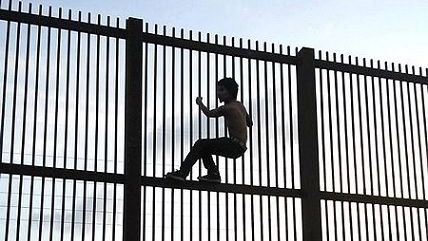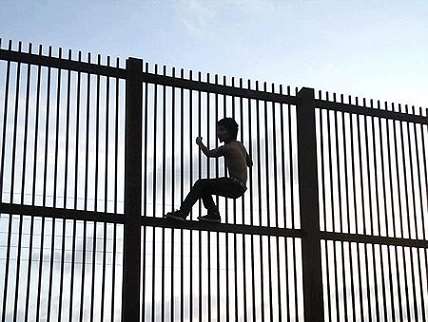What Kind of Smaller Immigration Deal Could Pass Congress?
Think small, get something done


Immigration reform has been on President Obama's election since it was deployed in 2012 to shore up support among Latino voters. Congress spent much of its working 2013 on legislation that ended up topping 1,000 pages, largely because, as Sen. Lindsay Graham (R-SC) noted supportively, lobbyists keep coming to legislators for more carve outs. So a bill theoretically about legal status for illegal immigrants becomes a bill about border security, jobs, employment verification, subsidies, and who knows what else. It shouldn't come as a surprise that such a monstrosity is having trouble getting passed. House Republicans are currently working on unveiling an outline of broad immigration reform principles.
Obama's decision not to prioritize immigration reform during his first term also lowered the odds it would pass. George W. Bush's similar effort at the end of his term also failed. An unpopular president can have the effect of making popular legislation easier to oppose. Bush's efforts were torpedoed by a coalition of conservative Republicans and liberal Democrats, including Obama himself, who as a senator in 2007 helped the attempt at immigration reform fail by pushing pro-union amendments that would weaken the bill and its support.
Most of the senate's current immigration reform bill and previous iterations is concerned with issues other than the human factor in the issue. While I've argued previously for amnesty for illegal immigrants, that solution is a non-starter in the current political climate. Nevertheless, perhaps a smaller, more focused bill that deals with the human cost of poor immigration policy would have a better chance of passing. Such a bill would not have to include e-verify, deal with any agricultural work specifically, or reform border security.
What it would have to do is provide some kind of legal status for the nations 7+ million illegal immigrants, the vast majority of whom are otherwise law-abiding. Crossing the border illegally, after all, is merely a misdemeanor. Opponents of immigration reform, including some legal immigrants themselves, complain that illegal immigrants didn't "wait in line" like everyone else. That line should be cut as part of immigration reform. Entering the country legally ought to be simpler for those seeking to immigrate to the US that have the means to do so. Concerns about illegal immigrants seeking to abuse the welfare system are largely unfounded, but could be alleviated by offering expedited legal status for illegal immigrants willing to forgo access to the welfare system. Every illegal immigrant I know (quite a few) has said something along those lines; they want to be legal in this country and couldn't care less about getting welfare. They want to work, and ought to be allowed to. To that end, immigration reform should make it easier for employers to hire the employees they want without having to worry about running afoul of immigration law. If this kind of narrower immigration reform couldn't garner the support it needs to pass, reform supporters ought to consider a concession that could dampen opposition: making it easier to deport illegal immigrants convicted of violent crimes, and perhaps even banning such immigrants from ever returning to the US. Again, most illegal immigrants would be ok with this: they are law-abiding people just as upset by illegal immigrants who drink and drive and hit and run as legal immigrants and US citizens are.
Getting immigration reform passed in a divided, hyperpartisan Washington where each side is mostly interested in demonizing the other is a difficult task. When it is in the form of a 1000+ page bill that looks and feels like a clusterfuck that expands the power of the federal government while promoting more profligate spending and ignoring the actual human beings it is theoretically supposed to help, it's an impossible one.


Show Comments (20)